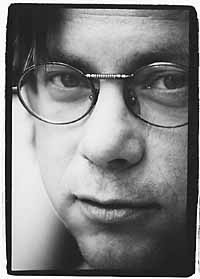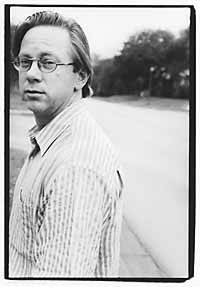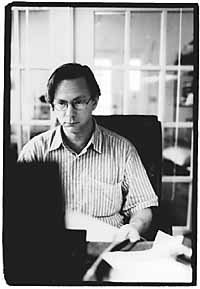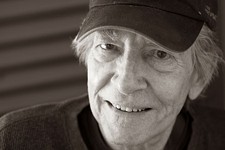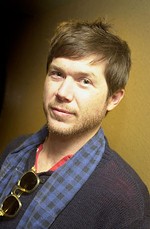Writer-at-Large
By Clay Smith, Fri., May 14, 1999
|
|
Hadrian's Walls gives the lie to Draper's austere self-analysis. Incredibly sure-footed, Hadrian's Walls opens with an unnamed narrator who eventually turns out to be Hadrian Coleman, "a man who not only distrusts his instincts but actively fears them," who returns to fictional Shepherdsville, Texas -- Draper's stand-in of sorts for Huntsville -- to receive official pardon for a murder he has committed. His best friend Sonny Hope runs the appropriately named Department of Criminal Retribution but that friendship doesn't ensure, by any means, Hadrian's innocent status. Suffice it to say that Hadrian and Sonny's friendship is inextricably nettled by blackmail, murder, and adultery and that the genuinely thrilling and engaging unraveling of those nettles provides the narrative impetus to Draper's novel. Draper absolutely triumphs in his depiction of place -- he has the seething menace of East Texas down pat by means of all the techniques a novelist uses to depict place: dialogue, characterization, and landscape. That's one reason Draper's publisher and editor at Knopf, Sonny Mehta, bought it. "I didn't buy it as a regional novel," Mehta says. "I was charmed by the book because if a book can lull you into believing absolutely that you know the place as well as the novelist does, then I think that's really a great accomplishment and that's something I came away with from that book and from subsequent readings of it."
In a September 1996 article in Texas Monthly about The Liars' Club author Mary Karr, Draper wrote that Karr had produced "that rarest of publications, the literate pageturner," and Hadrian's Walls falls neatly into that category. It has lyricism and insight, but the pacing of its plot is a thoroughly scintillating experience to delve into. ("Scintillating" is a somewhat embarrassing adjective to use to describe the book since it's an adjective very, very few of the characters in Hadrian's Walls would ever use.) Knopf is so confident of the book's merits that it ordered a first printing of 60,000, quite a few copies of an author's first literary novel.
One of Draper's friends, American Way columnist and former Austin Chronicle Politics editor Jim Shahin, says that "one could make any number of arguments about what [Draper] is like as a person and probably every single one of them would be right." Even cursory discussions with people who know Draper bear out the truth of Shahin's observation, but several of Draper's traits make repeated appearances:
- Draper's younger brother John, the director of a mental health hotline in New York City, says that his brother's biggest enemy as well as his greatest ally is "his own sense of expectations. You know, he would get very down on himself for a time for things not working out but that would also spur him on to a much more single-minded focus to make things happen."
- Evan Smith, deputy editor at Texas Monthly, recalling an engagement party he and his wife gave for Draper and his fiancee (now wife) Meg Littleton: "I toasted Robert and I said, 'You know, Robert is a wonderful writer and a great person and an incredibly smart guy: Just ask him.' And I meant that as a little dig at Robert, who's never had a shortage of self-confidence."
- Novelist Carol Dawson, a friend of Draper's: "He has very strong opinions and I think that a lot of writers need to have that strong sense of self in order to write fiction because you're constantly slipping out of your own boundaries and becoming another character and I think one of Robert's strengths is that he is so contained a person. ... One of the reasons that's a boon for him is because when he is writing a fictional character ... he's put himself aside as one must do and it's good that he has a self to come back home to ... because I think a lot of writers don't."
- In January 1998, after he had left Texas Monthly, Draper commented to The Dallas Morning News that the publisher of Texas Monthly, Michael Levy, "can be a very unpleasant person" but that he had "a lot of admiration and exasperated affection" for Levy, who found Drapers's comments "inappropriate and unfair." Levy now says that Draper is "very talented, he's a great journalist and his leaving the magazine was a loss. ... We all have our pluses and our minuses and he has far more pluses than minuses."
- Writer Stephen Harrigan remembers this reaction upon first meeting Draper: "You meet somebody and you say to yourself, 'Ah ha! This person wants to go all the way,' and that was always the sense I had of Robert."
- Texas Monthly editor Gregory Curtis says that "The one word that [Draper] always used was 'conflict.' In a story that he was doing, he always wanted to search out the conflict and he was drawn to stories where the conflict was evident in the core of the story. ... I think before him I'm not sure that that particular word was used as much as it came to be used."
- exas Monthly senior editor Joe Nick Patoski notes that "Robert was refreshing in the sense that he ... was really hungry to write and came in and certainly announced his presence. He didn't kind of fool around or feel his way in, he came in and did it. He sticks out like a sore thumb in that respect over the years because he was determined to be a writer."
|
|
That familiarity is crucial to an understanding of Draper. There's a theory about him that goes something like this: Leon Jaworski was Draper's maternal grandfather, a nationally known, powerful figure who prosecuted Nazi war criminals, was appointed by U.S. Attorney General Robert Kennedy to prosecute segregationist Mississippi governor Ross Barnett in 1962, and was the Watergate special prosecutor, in addition to being a senior partner at Fulbright & Jaworski, one of Houston's most prestigious law firms. Draper grew up watching Jaworski, who died in 1982, prosecute President Nixon and thus became interested in writing about power and the use and abuse of authority, which a cursory glance at the majority of the stories he wrote for Texas Monthly will reveal. The truth, as usual, is more complex than the supposition. People who have observed Draper's career often use the term "Robert Draper story" to refer to a certain type of article Draper wrote at Texas Monthly. They tend to be investigative stories about state institutions or cultural entities entrenched in old ways of thinking that have enthralling narratives and vivid depiction of landscape and characterization. A February 1994 cover story, "The Myth of the Texas Rangers," is a good example. So is "Manhunt at Menard Creek," an October 1993 article about the Texas Department of Criminal Justice's use of tracking dogs to find escaped convicts. But to say that stories like these, which get emphasized at the expense of the often hilarious personal essays he wrote for the magazine, are about power, is really a canard. What Robert Draper writes about, what really fascinates him, is frailty. Of the many recollections Draper makes about his grandfather, who has clearly been an active inspiration to him, one of them is particularly striking. Draper says that Jaworksi was "a man who on certain levels was clearly powerful but, you know, who I saw in an all-too-human way, whose ego I believe suffered in the wake of Watergate because what do you do after you try U.S. v. Nixon? He often said that and he sort of said it in a jocular way, but, I mean, it was a very poignant question to ask and I think from there he could only go somewhat down and he sort of alternately loathed and craved the spotlight."
And yet it might be easy to assume that Draper is something of an overnight success or that his lineage effected some benign vocational jumpstart for him. In reality, Texas Monthly senior editor Gary Cartwright (whose November 1975 article on Jack Ruby opened Draper's eyes to the fact that magazine journalists could use fictive techniques and thus really turned him on to journalism) is generous when he says that "it took Robert six or seven years to be an overnight success." It's actually taken about half of his life, at least since he was 18 and writing what he calls an "inane, egregiously autobiographical novel about some Holden Caufieldesque character that bore a frightening resemblance to yours truly." It was so inane Draper doesn't include it in his roster of writings.
Draper's self-termed "Spinal Tap experience" occurred when he returned to Austin from the Middle East in 1980 and began managing a local band, the Shades. Draper has no qualms about mentioning the early mistakes he made as a critic and reporter -- he became enamored of composite journalism, went a little overboard with negative modifiers just for the fun of it, and "had this unfortunate tendency in the late Seventies at The Daily Texan and in the early Eighties at The Austin Chronicle to write favorable reviews about bands I truly liked but liked perhaps mainly because of the woman in the band that I wanted to sleep with." The Shades was one of those bands. Draper managed the Shades for two years until the band dissolved in a hopeless tangle of romantic relationships and Draper went to work for the Chronicle in 1983, where he became the "Live Shots" editor and where he stayed for about nine months. He remembers his younger brother saying to him sometime in 1985, "When is the last time you wrote a word of fiction? I know that's what you wanted to do." With that fillip firmly in mind, Draper headed off to the Bennington Writers' Workshop in the summer of 1985 -- the same summer Bret Easton Ellis attended -- and credits that experience with putting him "more or less back on the trajectory."
For several years to come, success as a writer of either fiction or nonfiction was elusive. John Draper says that at that time Robert "was very much alone, which is such an invitation for self-deprecation and fatalistic thoughts and 'I'll never get anywhere' and 'Why aren't they responding to me?' ... He was just kind of fumbling about for whatever writing he could do that would kind of validate him as a writer and support himself as a writer so he could call himself a writer until he finally got published." By this point, Draper was working on his first novel, Armbrister. Set in New Braunfels, the novel concerns a U.S. Supreme Court justice (whose last name is Armbrister) who resigns from office under threat of impeachment for "a variety of malfeasances" and later runs for governor of Texas; it's a "Southern family novel." After Draper's 1990 book Rolling Stone Magazine: The Uncensored History was published by Doubleday and achieved critical and commercial success, he was able to procure the high-profile, "unassailable" literary agent Kathy Robbins to find a publisher for Armbrister.
She didn't, though she tried. Julia Null was a reader in Robbins' office at the time (but now, in an odd twist of fate, her name is Julia Null Smith because she married Evan Smith after Draper introduced the two of them). She read Draper's manuscript, considered it "the best thing I had read in my whole time in New York," and convinced Robbins to read it, whereupon Robbins became enthused and set up an auction for the manuscript. "You only sell things at auction if you think you've got a really terrific property that's going to be valued," Smith says. "And then no one took it. No one bid. And it was a huge disappointment, a huge blow, and I think it kind of took the wind out of everybody's sails. ... I don't think they were a good fit and I think that I was so in love with Robert's novel that I was the one who was trying to drive it and make it work."
The letdown didn't knock all the wind out of Draper's sails. "He could have just wadded it up and walked away, you know, the hell with that," Patoski says. "But what he did is he came back and he did it again and I think he even did it again." In 1994, after he had been on the staff of Texas Monthly for three years, Draper took off for three months to Palacios, on the Gulf Coast, to complete another novel, Under Mistletoe, about a little Gulf Coast town that is located on top of a
|
|
Most conversations with Draper somehow end up at the idea of work. The persistent Romantic glorification of the Muse and her fevered inspiration as the basis of creativity doesn't hold water with Draper. He calls it "preposterous." But, still, it's not really accurate to call Draper a workaholic because for Draper work isn't a soothing anodyne, something that lets him escape from some vague unhappiness in his non-working life. Work is how he defines himself and his work is writing. "I like the messy ordeal of sitting down and grinding the mortar of myself into an empty page," Draper says. By his own estimation, Draper sent Gregory Curtis 70 query letters between 1984 and 1991 suggesting ideas for articles. In the author's note to his Rolling Stone book, Draper quotes Tim Cahill, an early Rolling Stone writer, as saying, "People are always asking me what it was like in the early days. They're asking me about sex and drugs and rock & roll, and one of the things that people don't understand and can't appreciate is how hard we worked." The italics are Draper's. In a July 1992 article in Texas Monthly about Cormac McCarthy, whose All the Pretty Horses had just been published that May, Draper described traveling to El Paso to attempt an interview with the press-shy author. He found McCarthy's home and drove to it. The author was standing on his porch with a book in his hand and stared at Draper, who remained in his car. Then McCarthy turned around and went inside, perhaps to read his book. Perhaps McCarthy would have preferred staying outside on his porch but chose instead to establish the locked door of his house as a barrier between himself and a reporter. Draper, though, wrote that "Cormac McCarthy had simply gone inside, where his work awaited him." Draper has "a tremendous disdain for people ... that are born into a certain life of privilege that don't work for what they have. He can't stand that!" Shahin says.
Shahin says that Draper has "this sort of reputation for arrogance and everything but the fact of the matter is, you scratch the surface on him a little bit and he will make these almost endearing sorts of mistakes. And you can't believe that it's Robert Draper making these mistakes because there's something childlike about him, I swear to God!" Reader's of Hadrian's Walls may wonder how Hadrian, a convicted double murderer imprisoned before he is able to complete his education, is able to muster the literary powers necessary to refer to himself as "a boy insufficient with life" or as "a mere scaffold of a teenager." Hadrian's Walls is lyric, suffused with a dark lyricism that knows the blustery swagger of East Texas' jackass demagogues fully well. But the attempt to get Draper to address those more lyrical aspects of his work, to set that off against his mantra of labor, results in a trail of unintentionally obfuscating divagations. For all of his evident self-knowledge, it's frustrating that Draper blushes at speaking to that element of the writing life, but endearing, as Shahin notes. In the end, it's somehow fitting that the words "talent" or "gift" fail to make appearances in his speech. Writers who profess to speak effectively about inspiration usually don't. Those who don't even attempt to do so go about the task of explaining inspiration by writing more fiction. For Robert Draper, that seems to be a perfect solution.
Robert Draper will read from and sign Hadrian's Walls at Book People on Monday, May 17 at 7pm.





